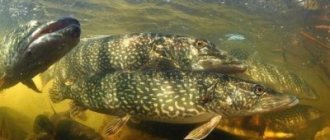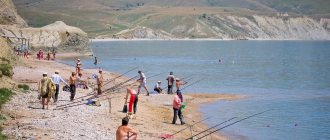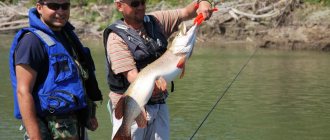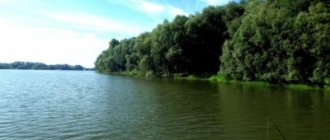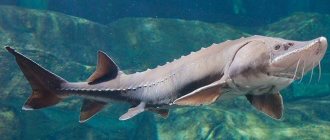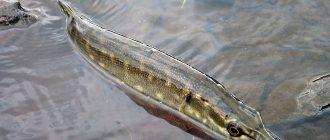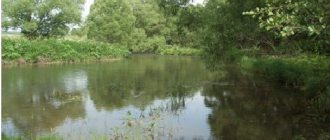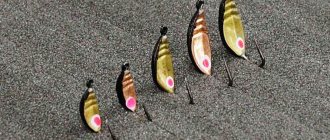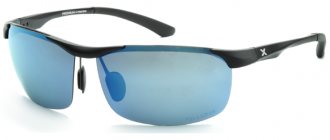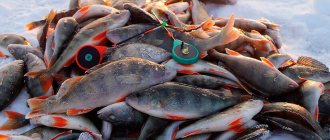Fishing is one of the favorite hobbies of many men, as well as some women. By going to a pond and picking up a fishing rod, everyone can relax, forget about everyday work and pressing problems, and relax not only with their soul, but also with their body. And if you are lucky, all this will be supplemented by a pleasant catch, which will be used to prepare fish soup and other delicacies. And in terms of fishing, Sochi has become one of the most profitable cities, where you can catch a variety of fish 12 months a year.
Geographical information
The source of the Sochi River is located on the southern slope of the Main Caucasus Range near Mount Chura at an altitude of 1813 meters. The river has a rapid flow, and along its course makes a series of falls from different heights, forming several waterfalls.
The main tributaries of the river: Iegoshka 1st, Ushkha, Ats, Agva, Azhek. Downstream the river there are settlements - Baranovka, Plastunka, Orekhovka, Azhek. Most of the river basin is covered with Colchis-type forests.
For approximately the first 10 kilometers of its flow, the river falls steeply from the mountains, flowing quickly through a narrow valley with steep, high and rocky banks. Below the confluence of the Ats tributary, the river valley widens noticeably, and below the confluence of the Azhek River, the first pebble islands appear in the riverbed. Approximately 28 kilometers from the source, the river breaks out of a mountain valley into the foothills. The slopes of the riverbed here are already significantly reduced, the river flow is calmer, and its bed forms a wide floodplain with thick 3-5 meter thick bottom layers of pebble-sand mixture (“alluvium”). The pebbles are underlain by thick layers of gray mudstone (ancient marine sediments).
There are very beautiful waterfalls on the Sochi River and its right tributary, the Orekhovka River. At the very mouth of the Orekhovka River, its bed ends abruptly, and a stream of water falls almost vertically from a height of 35 meters.
In its lower reaches, the river flows through the Central District of the city, and on the territory of the Central District of Sochi, where the banks of the river are encased in concrete. It flows into the Black Sea at the Caucasian Riviera sanatorium (on the right), and the Sochi seaport on the left.
The average monthly water turbidity of the Sochi River, like most rivers on the Black Sea coast, ranges from 200 to 500 g/m³. During floods, turbidity increases significantly, and practically never falls below 1-2 kg m³. Peak turbidity values reach 10-12 kg/m³, and even more.
The Sochi River is fed by snowmelt, rainfall and groundwater. Its water regime is flood. Water level fluctuations are subject to significant fluctuations throughout the year. In winter, the river experiences high water levels due to the melting of snow in the mountains. The spring flood period lasts 40-50 days. In summer, frequent short-term floods of the river occur due to rain. At the same time, in dry and especially hot years, significant shallowing occurs, up to complete drying out.
Sea fishing
The Black Sea is a huge body of water, the area of which is more than 430 thousand square kilometers, the total volume of water exceeds 555 cubic kilometers. The waters of the Black Sea are rich mainly in commercial fish. Here, too, there are species of no commercial importance, poisonous fish, and species found in the Red Book. In total, this area is inhabited by about 190 species of fish, 144 are marine inhabitants, and the rest are migratory or freshwater species.
Coastal sea fishing
For sea fishing in Sochi, it is not necessary to go out to the open sea. You can simply fish coastally: from shallow piers, breakwaters or in the Seaport. This method of fishing is a completely common practice, loved by local fishermen. Almost every day, many avid amateurs sit right on the piers near the Marine Station, but they cannot always boast of a good catch. As usual, fishermen come here early in the morning, sit near the pier, deploy their gear and fish. They catch fish for bread, chicken meat, and turkey meat. You can catch both small and medium-sized fish from the shore. The following species are often found here: horse mackerel, mullet, red mullet, gobies, crucian carp, garfish, croaker, perch, ruffe and other small species of fish. A big catch is not guaranteed, but you can always catch a small amount.
Fishing on the high seas
For those who want to truly feel the extreme thrill of sea fishing, try going further from the shore into the open sea. In the second case, new fishing opportunities will open up for you. In a three-hour trip on a boat, you can most likely catch up to three to six kilograms of small sea fish. Most often, they fish with several hooks at the same time (up to ten on a line). The fish readily “eats” shiny hooks and becomes prey for fishermen. For an organized exit as part of a group, you should come to the central building of the Seaport. On the right side of the building, there is a pier where ships are moored. A three-hour tour as part of a group will cost 1,500 rubles per person. Fishing gear is provided free of charge. Ships depart from the pier at eight in the morning every day. We have an individual sea fishing tour on a yacht in Sochi lasting 3 hours.
What kind of fish can you catch in Sochi
As mentioned earlier, fish are caught in these places all year round. Fishing in Sochi on the open sea will give you the opportunity to catch a huge variety of fish. Most often, fishermen catch red mullet, hake, and mackerel on their hooks. Less commonly you can find Black Sea herring, scorpion fish, bluefish and other species.
Barabulya
A small bottom-dwelling fish, reaching a length of 25-30 centimeters. It is found at shallow depths (15-30 meters) near river mouths. It is better to fish with crab meat, mussels, and boiled shrimp. Red mullet meat is considered a delicacy: it is tender, tasty, and extremely fatty.
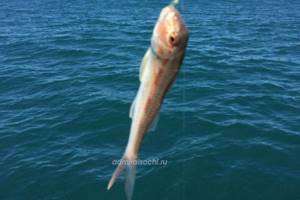
Horse mackerel
Horse mackerel is caught with shortened spinning rods on bare hooks with beads. The average length of the fish is 12 centimeters. Found in schools in shallow and deep waters. The meat is fatty, delicate in taste, rich in vitamins. In winter, larger mackerel are caught.
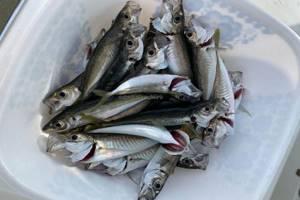
bluefish
Bluefish is the most predatory fish in the Black Sea, it has very sharp teeth, and even when it is not hungry, it still destroys other, smaller fish. It grows up to 40 centimeters in length and is caught in late summer and early autumn using spoons. It has lean and pleasant-tasting meat.
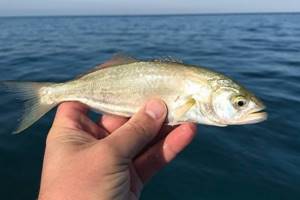
Pelamida
Pelamida lives in schools and belongs to the mackerel fish family. In the Black Sea, active fishing occurs in mid-summer for two months. If you find a flock of bonito, the bite will be very frequent. They are mainly caught using spinners and wobblers.
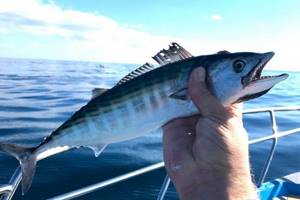
Black Sea herring
A schooling commercial fish of the Black Sea up to 25 centimeters long. Herring can be caught in the waters of the Seaport in spring and autumn. Fishing is carried out on a bare hook with mechanical baits. The taste is no different from regular herring.
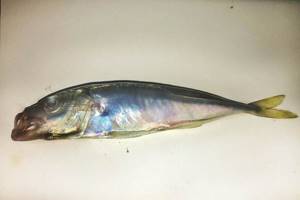
Hake (hake)
A medium-sized fish, as a rule, reaches a length of half a meter. There are larger individuals - up to 75 centimeters in length. You can often hook fish weighing more than two kilograms. Bottom fish. It is caught mainly by bottom trawl. Hake meat is dietary.
We are 15 years old
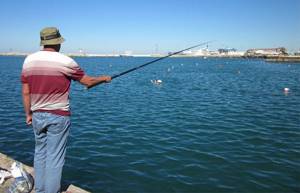
Fishing in Sochi is a very common phenomenon. People with fishing rods, spinning rods and other gear can be found both on the embankments of numerous rivers and on the breakwaters of the Black Sea coast, as well as in the Black Sea itself, on boats, yachts and even special fishing vessels. What kind of fish can be caught here, where and who is prohibited from fishing, and why are “seafood” so expensive in stores at the Black Sea resort? An NHS correspondent was looking for answers.
Unguarded "protected area"
7 a.m., embankment of the Sochi River, between the Seamall and Sochi Electric Grids. Below, right on the rocks, near a babbling river, there was a man with several fishing rods. He holds one of them in his hand (this is a spinning rod), and carefully watches the others, fixed between the stones. In short, a real fisherman.
Evgeniy (as the catcher introduced himself) has lived in our city since birth. The native Sochi resident, according to him, began fishing in adulthood and is now unable to give up his favorite habit.
“Here, on the embankment of the Sochi River, the fishing place is rarely empty,” Evgeniy . – If I’m not there, other fishermen come, if I fish in the morning, then there are more of us during the day, and even more in the evening. But this depends on many conditions: whether it was raining, whether there are clouds in the sky, how deep the river is, and much more. I won’t tell you all the secrets, but if the weather conditions are favorable, a couple of dozen fishermen gather here. There are even more of them on the embankment leading from Riviera Park. We catch different fish: if a small one is caught on a hook, then it goes to feed the animals, if it is larger, then we eat it ourselves.
Power engineers warn of danger, but fishing in the power line zone does not stop
But here’s what’s surprising: along the embankment there are huge poles of high-voltage lines. On these poles and even on the slopes to the river there are warning signs that fishing is prohibited here, that this is a dangerous protected area. When asked why they constantly fish here, Evgeniy was at first confused, but then found the answer.
“There is no danger if you are an experienced fisherman,” he . – Firstly, we understand perfectly well that the area is risky, so we fish very carefully, trying to position ourselves away from high-voltage supports. Secondly, we have never seen any inspectors, no raids, no fines. Nobody is driving us away from here.
But Sochi Electric Grids has its own opinion on this matter. The press service told us that they hung such signs for a reason.
“Fishing near power lines is unacceptable,” explains a representative of the press service of Sochi Electric Grids. – The height of the supports of distribution power lines is on average 9-11 m, the height of the suspension of the lower electrical wire is 6-9 m. The length of the rods reaches 6 meters or more. When a fishing rod or wet fishing line approaches the wires, a person is exposed to electric current. Moreover, for this it is not necessary to touch the wire - the electric current can “pierce” an air gap up to several meters long. With increased air humidity, the dangerous distance increases, and when using carbon fiber rods it can reach tens of meters. The result is electric shock, severe burns, often leading to death. In this case, people near the fisherman can also be subject to electrical injuries, since step voltage occurs within a radius of up to 8 meters.
Unfortunately, cases where fishermen were injured and even died from electric shocks do occur. The stories are similar:
There were several cases when fishermen were injured and even died from electric shocks both in Sochi and throughout the Krasnodar Territory. The stories are similar: a fisherman tried to cast a spinning rod, and it was not even necessary to catch the wire. It is enough for the fishing rod to be within the range of the electric current, especially in conditions of high humidity. The person received a fatal electric shock, and his partner, most often a relative, who tried to save him, came under step voltage and also died.
An indicative tragic incident occurred on May 5 of this year in Krymsk. A 17-year-old boy was visiting his grandmother and during the rain he went fishing on the railway bridge. While pulling out another catch, he fell into an electromagnetic field and received an electric shock of 27 thousand volts.
Alas, Sochi power grids only have the right to warn fishermen about the danger. Warning signs are only advisory in nature, since, in fact, no one is guarding the protected area. The notices do not scare away the fishermen, and the Fisheries Supervision Authority does not even look here, and if it does, then, according to the law, it can only warn the fisherman about the danger, but not fine or confiscate the catch.
If you want to, but you can’t, then is it possible?
In the rivers of Sochi you can most often catch chub, black belly, bull and roach. Well, here’s the problem for fishing lovers: you can’t sit with fishing rods on all rivers, but mainly only on small bodies of water within the city, since almost all large mountain rivers, estuaries and tributaries in Greater Sochi have a year-round fishing ban.
If any of the residents and guests of the city do not remember or do not know, then since 2012 the Order of the Ministry of Agriculture of the Russian Federation of June 20, 2007 No. 328 “On approval of the Fishery Rules for the Azov-Black Sea fishery basin” has been in force, that is, for our resort . According to this document, fishing on the territory of Sochi is prohibited all year round in the rivers Psezuapse, Shah, Mzymta, Psou and at a distance of less than 1 kilometer on both sides of the mouths; in front of river mouths at a distance of less than 500 meters on either side of the mouth. Even in the rivers Kudepsta, Khosta and Sochi, fishing is prohibited in certain areas that are part of the Sochi National Park. For fishing in such zones, violators face a fine of 300 thousand rubles or imprisonment for a period of six months. Do you think such harsh sanctions deter fishermen-poachers? Not at all, since our city lacks proper control over these protected areas.
“In fact, raids are regularly held on the territory of the Sochi National Park, including with our participation,” says Revaz Pruidze, . – But in mountain rivers and in dangerous areas, Rybnadzor specialists must carry out constant monitoring. But as far as I know, there are only two such inspectors in the whole of Greater Sochi, and they rarely go out to catch violators. They are simply not able to cover our entire resort. Fishermen confirm this information: a person who registered on the Internet under the nickname “ doc704 ” writes: “Yes, you can fish everywhere, except for prohibited fish, trout, for example, but if you catch it, then there’s nothing terrible, no one will fine you will write it out. When was the last time you saw a fish inspection? Even if they find one trout, they will simply make a comment and that’s all.”
So it turns out that there is a ban, but there is no punishment, and if there is, it is very conditional.
Boat, cutter, yacht or breakwater
Still, the most basic fishing in Sochi is sea fishing. The lucky ones can come home with a selection of wonderful Black Sea fish. These are red mullet, horse mackerel, sea ruff and goby. If you're lucky, then pelengas, flounder, mullet. And if you are very lucky, then a sturgeon and a small shark.
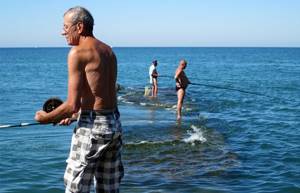
There are two options for private sea fishing: with fishing rods from breakwaters (the most common option) or from a regular or motor boat (boat, yacht). The second option is the most preferable: there are more chances to catch a good fish. At the same time, this method is not so simple.
According to specialists from the Sochi organization of fishermen and hunters, if a motor boat weighs less than 200 kg and its engine power does not exceed 10 horsepower, then you can go fishing in the sea without special registration. It is enough to simply obtain permission from the Border Service by providing a copy of your passport and documents for the boat.
However, if the parameters of the sea vessel are greater than those specified, you will have to register with the State Inspectorate for Small Vessels (state inspection for small vessels), provide a certificate for the right to operate a water vehicle and many other pieces of paper. Therefore, most Sochi residents prefer to fish from breakwaters without going out to sea. There are fewer chances for a good catch, but there are also fewer additional costs.
Seaside town without sea fish
It’s paradoxical, but true: we live in Sochi, and in our stores sea fish is sold at such a price that not everyone can afford to buy it. Why is that? The answer is simple: there is practically not a single specialized enterprise left in our resort, except for trout farming. The main reason for this is the financial issue.
Industrial fishing in Sochi is supervised by the Krasnodar Territory, namely the Ministry of Agriculture and the Ministry of Natural Resources. The city has nothing to do with the Black Sea.
“The other day, an auction was held for the right to industrial fishing in areas of the Black Sea opposite Khosta and Adler,” explains Revaz Pruidze . – Their companies won, paying from 11 to 14 million rubles. Most likely these are representatives of companies from other regions of the country or Krasnodar. I do not rule out that such companies may act in the interests of foreign states in order to transport the catch to them, and not to Russia. Now imagine a Sochi entrepreneur who must not only pay such fabulous millions, but also, according to the requirements, be assigned to a seaport, have refrigeration chambers in it, obtain a license for quotas, and have a fishing area. This is still tens of millions of rubles. Expensive pleasure.
According to Revaz Vladimirovich, in Soviet times several fishing farms operated in Sochi. Quotas and prices were much lower back then, and there were more opportunities. After perestroika, gradually these farms, one after another, began to cease to exist. That is why sea fish is so expensive in the shops of the Black Sea resort: it is supplied from other regions, and sometimes even from abroad. The route is this: fish are caught here, exported to other countries, and from there it comes back to us, but with a three- and four-fold increase.
The relevant departments of the region simply turn a blind eye to this fact. Indeed, why provide subsidies and attract Sochi businessmen if you can make multimillion-dollar profits from the outside?
Unreliable and dangerous
One way or another, river and sea fish still appear in our city, and at a very reasonable price. True, not in large stores, but on beaches or near markets. Seafood is sold by private individuals, mainly from cars or from boxes along the road.
The Sochi Society of Fishermen and Hunters has repeatedly monitored such, so to speak, fish trading points. The collected data showed that none of the sellers caught the fish themselves; moreover, even the suppliers did not catch it themselves. Live fish products are either purchased in bulk from large suppliers directly at the ports, or they go to Abkhazia to buy them. There are only a few of those who caught it themselves and sell it.
Experts do not recommend purchasing such fish secondhand. Firstly, it is still more expensive than its nominal value, and secondly, the conditions of its transportation and storage leave much to be desired. After purchasing the products, private traders transport them in ordinary cars, without refrigerators, and then, in the same way, without refrigerators, they sell these goods on the roadsides under the scorching sun. Not a single “live fish” can withstand such a test: even if it is still moving, it is most likely dangerous to cook and eat it.
Laugh or cry?
Finally, we’ll tell you about how our editorial team wrote a request about this pressing issue to the Rosprirodnadzor department. First, we sent our questions to the Sochi department of the federal structure. There we were informed that the letter would be forwarded to the regional authority, since only it can coordinate the answers.
Let's not be unfounded and list all the questions that were asked to the department: Where is private individuals prohibited and allowed to fish in the city of Sochi (special emphasis on fishing on rivers)? Why do people regularly fish in the bed of the Sochi River, along Constitution Street of the USSR, even though there are signs prohibiting fishing on the power line poles? Is fishing in this area illegal? What sanctions await violators who fish in prohibited areas? Is it possible to engage in industrial or amateur fishing in the Black Sea? What permits do I need to obtain for this, what fees and to whom should I pay?
We deliberately did not publish this article in order to wait for Rosprirodnadzor’s response to our questions. We received an answer, but it was disappointing, to put it mildly. In less than a page (if you do not take into account the “header” of the letter), the main fishing supervisor informs us about anything, just not what we asked. Here is a list of decrees of the Government of the Russian Federation, Rosprirodnadzor for the Krasnodar Territory and Adygea, a list of aquatic biological resources listed in the Red Book... But not a single specific answer to any of the questions we asked. Moreover, we were informed that “the extraction (catch) of species of aquatic biological resources listed in the Red Book of the Russian Federation is permitted in exceptional cases... for the implementation of traditional economic activities of indigenous peoples of the North, Siberia and the Far East of the Russian Federation.”
What do Siberia and the Far East have to do with it? As they say, no comments, although you can add something. The regional Rosprirodnadzor could well have instructed its Sochi branch to provide the NGS with all the necessary information on our issues. Why he didn’t do this, but got off with an absolutely incomprehensible reply, we can only guess. We very much hope that after this article the federal department will understand the situation and still send us a clear and reasoned answer to the questions we asked.
Comments for the site
Cackl e
With a “license” to visit Neptune
Spearfishing in Sochi is offered either by yacht clubs or special companies. A tour to the world of the underwater kingdom in the vicinity of Sochi usually includes:
- A group of like-minded people of 5-8 people;
- Accompaniment by an experienced instructor;
- A guide who knows the fishing spots.
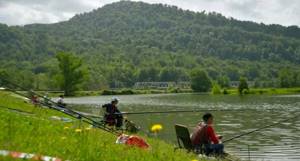
Typically, such tours last the whole day and include an evening dinner of caught fish as a positive ending.
The most common inhabitants of rivers
Let's start with who lives here. The most common and popular fish in the local rivers is the podust, or “black belly”, as the locals call it. However, the belly of the podust is not black, but white and silver. The black film is in the inner part of the fish’s abdomen, which must be removed during gutting.
Otherwise, this film will give the fish a bitter taste. It is for this need to perform an additional operation when gutting that the locals gave the name “black belly” to this fish.
Barbel and chub
Another popular and interesting fish of the local mountain rivers is the barbel. In terms of habits and habitats, this fish is not much different from the podust, so it is most often caught in parallel in the same way. The barbel sticks to the bottom more, sometimes hides under stones and can stand in holes.
Now let’s move on to the most widespread, although not the most impressive in size, representatives of the fish community of mountain rivers. First and foremost is the ubiquitous minnow. I remember that in childhood we caught it in dozens and hundreds, stringing it on kukans. Moreover, household matches were necessarily tied to both the upper and lower parts of the kukan. This made it easy to thread the line through the gills and mouth of a small fish.
The roach here rarely reaches a size larger than 10 cm, but in by-catch it is considered a quite decent fish.
The most secretive and peculiar inhabitant of the river bottom is the sculpin goby. This fish always gives surprises, being found in various incredible places.
In childhood, at the very beginning of our fishing practice, we made short half-meter fishing rods from bamboo, to which a piece of fishing line less than a meter long was tied. At the end of this super complex tackle there was an ordinary hook and a small sinker above it.
And here's what you need to know: DIY spoon bait made from a copper tube for pike perch
A dung worm was used as bait. Such equipment was lowered to the bottom next to large coastal stones, in the cracks between them, and then played along slightly.
You could feel the goby bite in your hand - it was surprisingly interesting and effective for novice fishermen.
Fishing boat designs
Any boat is suitable for sea fishing, but there is a separate type of boat specifically designed for fishing. Some models may cover multiple fishing methods. Typically, offshore fishing boats are about 3.70-5.00 m long, and are equipped with outboard engines ranging from 15 hp to 100 hp, a side console, and an opening deck. Such a boat will provide the crew with maximum stability in average weather conditions. The vast majority of these boats are built from extruded aluminum or fiberglass.
But if fishermen want to get to the habitat of fish that live outside the coastal zone, they will need a boat with hull dimensions of at least 5.00-6.00 meters and a “V” shaped bottom. The choice of such boats is very large. The most popular design today is the cuddy cab. This design offers a versatile deck with enough space on board for several people to sleep overnight. This boat has a latrine, a freshwater tank, and a small galley. Upstairs there is a so-called seating area with a control console, an awning, sofas and a grill on which you can cook your catch. These boats are typically trailer-mounted, outboard or inboard, and made of extruded light alloy, aluminum, or fiberglass. The “V”-shaped hull copes well with strong sea waves and changeable adverse weather conditions. These boats are suitable for various types of fishing.
If you want to hunt big fish on the high seas, you will need a large, roomy boat with a refrigerator to store your catch. Typically, designs with a central cabin location have a large fish hold. This design lacks many amenities and living space to accommodate a cargo compartment. This design allows easy access to the bow of the boat and also provides excellent visibility from the cockpit. Any type of vessel with a closed cabin and a V-shaped hull is suitable for the Black Sea.
How to increase your fish catch?
Over 7 years of active fishing, I have found dozens of ways to improve the bite. Here are the most effective ones:
- Bite activator. This pheromone additive attracts fish most strongly in cold and warm water. Discussion of the bite activator “Hungry Fish”.
- Increased gear sensitivity. Read the appropriate manuals for your specific type of gear.
- Pheromone-based lures.
Croaker fishing
Scheme 1
Scheme 2
1 — “Owner” swivel; 2 — silicone stoppers; 3 - heat-shrinkable cambric; 4 — tear-off sinker (70 g) from reinforcement; 5- feeder with crab meat; 6 — anti-twist tube (40 cm); 7 — Kevlon leash 0.2 mm (30 cm); 8 — Mustad ultra point hook No. 6 with hair equipment; 9 — main line Kevlon 0.2 mm.
To avoid errors in the experiment, two equipment was sent into the darkness of the night: with and without a feeder. Before 4 a.m., we managed to catch nine small croakers (up to 1 kg). The bites occurred at regular intervals. At the beginning of five in the morning, with the arrival of the morning breeze, the reel's clutch quietly squeaked and after a pause began to jerk the line.
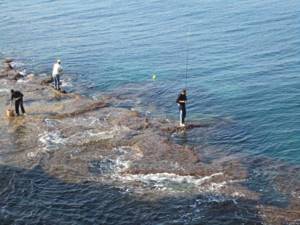
After a 20-minute struggle in the landing net, we managed to get the largest trophy of the last three years: a handsome light-colored croaker pulled 6.1 kg. The sinker was lost during the struggle, and the plastic feeder looked very pitiful. Subsequently, we came to the conclusion that the anti-twist tube needed to be reworked.
Stepping back 30 cm from the end on the hook side, I bent it, pre-heated, at an angle of 45°, placed the sinker attachment point at the bend point, and the feeder itself on a short 10-centimeter segment (Diagram 2). It was in this form that this design turned out to be optimal.
Four more times such equipment justified my hopes: the smallest croaker in two months of targeted hunting for the owner of underwater grottoes weighed 870 g, and the frequency of effective bites (especially in the second half of September) proved that the system of this equipment is much more effective than those used on the coast.”
- Reservoirs in the Kaliningrad region ⇩
- Free fishing in the Kaliningrad region ⇩
- Paid fishing in the Kaliningrad region ⇩
- Prohibitions on recreational and sport fishing ⇩
- Summer fishing ⇩
- Winter fishing ⇩
- Spring fishing ⇩
- Sea fishing ⇩
- Fish biting forecast in the city of Kaliningrad ⇩
- Weather in the Kaliningrad region ⇩
Kaliningrad is famous for the extraction of not only minerals, but also products of animal origin. Most tourists come to this place to enjoy hunting and fishing.
This area is home to almost 180 species of fish. Often caught by fishermen:
- Ruffs.
- Flounder.
- Mullet.
- Gobies.
- Sea bass.
- Red mullets.
- Horse mackerel.
- Sprat.
- Herring.
- Acne.
- Anchovy.
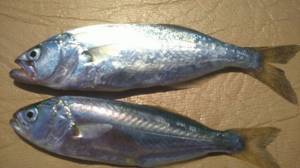
In summer it occurs:
- Tuna.
- Pelamida.
- Mackerel.
- Rarely, but you come across sultanas.
- Beluga.
- Sargans.
- Gorbyl.
- Dark.
There is an abundance of fish of different sizes in the Black Sea. Gobies are popular and are a delicacy for many. To attract their attention, it is better to place the bait at the very bottom. There are a lot of mullet in the sea near the shore, singili, a medium-sized fish with an orange spot on the cover of the gills.
Fishing in the Crimea, closer to the Caucasus, is successful for small horse mackerel. Quite large individuals are found not far from Georgia and Abkhazia. Horse mackerel often recklessly searches for prey, literally jumping out of the water. If you find yourself at sea at such a moment, catching horse mackerel will not be difficult.
Catching sea crucian carp with a fishing rod is successful in the waters of the Black Sea; shrimp will be used for bait. Beautiful bright wrasses are found in the coastal zone closer to rocks and stones overgrown with algae. The wrasse fits on almost any tackle. There are a lot of perches in the sea; anglers love to catch this type of fish.
There are, of course, a lot of crabs, shrimps, and mussels of various sizes in the sea. But poisonous fish can also be caught on a hook: dragonets, sea ruffes, which are similar in appearance to other species. You need to be careful. If the fish is unfamiliar to you, it is better to release it back to avoid poisoning.
Comfortable fishing in Sochi on the lakes
Local rivers and lakes are rich in such fish. The lucky ones catch salmon, mackerel and pike. On rivers they choose the Bolognese fishing method, a fly rod, a spoon, a wobbler and a match. Well-known fishing spots have good roads, camping areas and parking.
The Rybino complex is located at the foot of Achishkho on a picturesque chamomile meadow. Your choice is one of 3 stocked lakes with carp and trout. This is where people come to compete with colleagues for the biggest trophy. There is a chance to catch carp weighing 5 kg or trout weighing 2-3 kg. The best time for fishing is summer. Additional services - horse riding, sauna. The complex is located approximately 3.5 km from the village of Krasnaya Polyana.
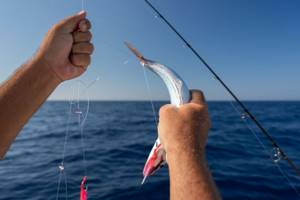
Achigvar Lake consists of 2 lakes. In the big one they catch carp, grass carp, carp, and trout. In the small (VIP) - carp, carp, grass carp, sturgeon. The shore is landscaped for complete relaxation. After the competition for the best catch, do you want to fry, smoke the trophy or use it as a fish soup for the whole team? The recreation center staff will take care of all the hassle of preparing dinner.
If you are interested in paid trout fishing in Sochi on the lakes, the ponds located next to the trout farm in the Adler region are suitable. From here there is a magnificent view of the Caucasus Mountains; gazebos are equipped along the banks. People come here to fish at any time of the year. In the ponds you can catch trout weighing 0.5–1 kg, carp, carp, grass carp, perch, crucian carp and even pike. The average catch is 5 kg. If you attended an excursion to a trout farm and a glass blowing show, the ponds are located nearby.
Donkey fishing
You can catch barbel using primitive donks at any time of the day, but they are especially effective at night. In the dark, the barbel is more willing to take bait that is playing in the current, but is in place, than floating or rolling along the bottom.
The fishing rod is usually an inexpensive spinning rod. The equipment used is different; they can have from 1 to 3 hooks.
Set a good example!
Fishing, our favorite pastime, is the most wonderful hobby. It decorates our life. makes it brighter and more colorful. Choose as partners those who are positive, sincere and enjoy your successes more than their own. Don't spoil your fishing with alcohol - it will never make it better. Try to keep the river banks clean and remove not only your own, but also other people’s garbage. Set a good example in everything: in relation to friends, hobbies and bodies of water. If we all behave this way, our lives will become exactly what we want them to be.
